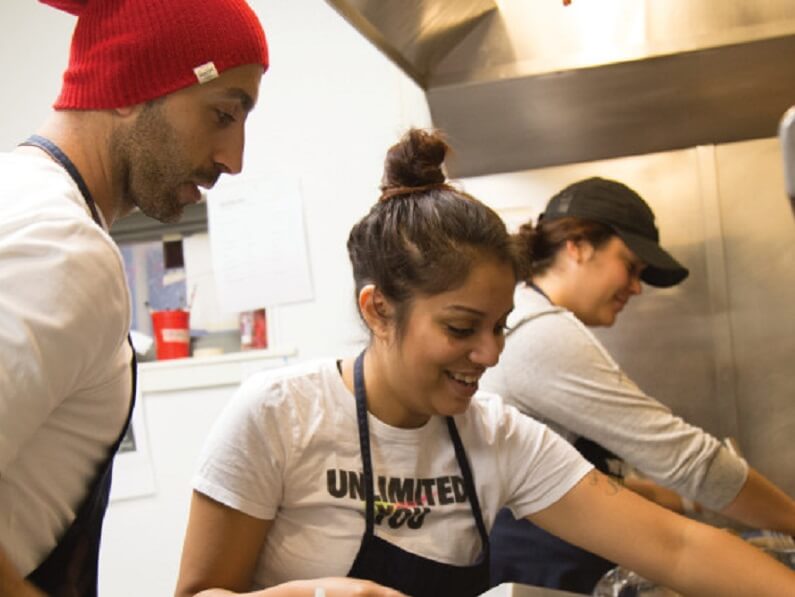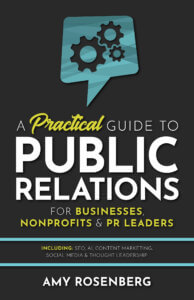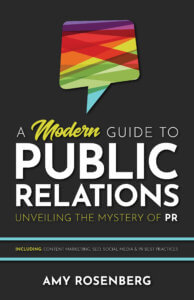Oregon is the only state in the nation that keeps getting hungrier.
Jen Carter knows about hunger. Not as the former Kitchen Manager of a drop-in center for homeless youth. Not as the new Program Assistant for Metro HomeShare. Not as a current Advisor the Hunger Free Leadership Institute (H-FLI). But as a former fellow for H-FLI, Jen understands.
“The women in my family have had the urge to feed with each successive generation. The need for extra food passed down in the genes with wide hips and a love for butter. Gardens became a family tradition,” Jen wrote in her application essay for acceptance into the H-FLI fellowship. “I was never conscious of not having enough as a child. There was always food. There were treats that tasted of soil and the delta breeze. My parents fought over debt, borrowed money from grandparents, took a second job cleaning houses — but there were enough fresh strawberries to stain your lips red.”
The essay moves on to explain that while people go hungry, there is enough food through farms and personal gardens. However, we lack the resources required for harvesting and delivering that food to the needy. A boilerplate at the bottom of the article points to the state’s nationally leading Farm to School and School Garden Programs as answers. Recently on the chopping block, a bill supporting grant funding for these two programs passed unanimously in this summer’s legislature, preserving the 4.5 million program for schools statewide.
H-FLI may have been part of that successful outcome. Created by Partners for a Hunger Free Oregon, the Institute is an eight-month training program that empowers and supports community leaders (“fellows”) in their quest to end hunger on a local-level. Jen discusses how the fellows are representative of the communities they serve. Many have experienced hunger firsthand, whether that be through working in a food pantry or receiving its services.
With Oregon coming in as the country’s sixth hungriest state and the only state that’s experienced an increase in hunger over the last few years, we need people like Jen in our corner.
“Each year we are getting hungrier, but we have one of the best Supplemental Nutrition Assistance Programs [SNAP, formerly known as Food Stamps] in the nation. Why?” Jen rhetorically asks. “The rise in cost of living isn’t being matched with the rise in wages. As rents increase, access to food decreases.”
Through the conversation I discovered that getting access to food isn’t always a given, depending on where you are, how your population is voting, the cost of your rent and even the color of your skin.
Many of you already know that women, especially of the single variety, hold a spot on the list of the disproportionately hungry in Oregon, but Jen dives a little deeper, painting a picture of what hungry looks like here.
Rural populations — These communities see a lot of “underemployment,” which means that their employment is often seasonal and unstable. While Portland offers programs to address this, many other areas do not because food is legislated differently throughout the state. However, the Oregon Food Bank is stepping in to help these communities with an eastern Oregon office and Partners for Hunger Free Oregon also spearheads initiatives for these communities.
Minorities — Jen says that 30-40 percent of African Americans are hungry in Oregon. These massively disproportionate numbers are caused by systemic racism that has continuously displaced African Americans. Not only were blacks banned from owning property in the early days, there were restrictions on where you could live. The allowable areas constantly moved, making it nearly impossible for many to build up equity.
Even recently, minorities are being displaced. Take the Memorial Coliseum for example: established African American neighborhoods were torn down during its construction. This type of gentrification is still happening today in North and Northeast Portland.
Constantly being on the move can take a massive toll on vulnerable populations. Not only does it deter equity — imagine being pushed into an area where you don’t know your neighbors, can no longer walk to your store and must find a new place of worship. Your entire community and network is displaced. Moreover, costly rental deposits and multiple application fees are paid with every move — probably coming out of your family’s food budget.
Seniors — The rise in housing costs mean more and more seniors are going without. When burdened between choosing food and medication, housing, or transportation, many will forgo the food. Wouldn’t you rather skip a meal than spend a night on the streets?
Jen’s new position as Program Assistant for Metro HomeShare can help ease that burden for seniors and others. Through the Ecumenical Ministries of Oregon, the group helps Home Providers stabilize and retain their housing, while offering access to affordable rent or services to Home Seekers.
Part movement and part organization, as Jen defines it, HomeShare’s ingenious response to rising home costs is to play matchmaker — connecting people who need a place to live with people who need help paying the rent or mortgage. Extra services could also be part of the package. The elderly, busy, or disabled can incorporate home maintenance and maybe even errands into the agreement. HomeShare puts it all together.
Beyond groups like HomeShare, there are many resources available that aren’t being utilized by everyone who needs them. The reasons stem beyond the idea that people don’t know about them (although that might sometimes be the case), and can be pointed to situations such as:
- Unreliable access to transportation.
- Working two jobs, therefore unable to visit during open hours.
- Recent immigrants battling fears of needing to identify themselves. Although most food pantries (including the Oregon Food Bank) do not check identification.
- General government mistrust that’s been passed down through family history with foster care or law enforcement.
How can people help?
Jen advises us to first visit: www.oregonhunger.org to see what kind of help is needed. However, the ideas she rattled off included:
- Volunteering for the Oregon Food Bank.
- Asking how your local food pantry needs help.
- Harvesting once a month for a community garden.
- Participating in letter writing campaigns.
- Calling your local representative to state your opinion on issues affecting hunger.
This is Episode 202 of StreetTalk, a podcast about Portland’s ever-changing communal landscape.









